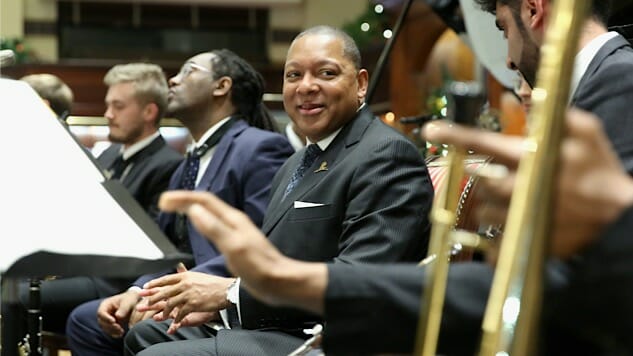Wynton Marsalis Doubles Down on His Attack on “Most” Hip-Hop
A day after the trumpeter said rap is "more damaging than a statue of Robert E. Lee," he defends his negative view of the music.
Photo: Getty Images
On Tuesday, Wynton Marsalis caused a bit of a stir during an interview with the Washington Post’s Jonathan Capehart when he attacked hip-hop culture as a negative force in culture and declared that rap music is “more damaging than a statue of Robert E. Lee.” His generally unfavorable view of hip-hop—which he has not been shy about sharing over the years—stems from his belief that much of the genre sells out black culture by perpetuating racist stereotypes.
On Wednesday, after the inevitable avalanche of reaction reached him, Marsalis took to his own Facebook page to post a lengthy retort in defense of his views, which he repeatedly insist refer to some hip-hop and not all. As for his most incendiary comment, that hip-hop does more damage to racial progress and harmony than a Confederate war memorial, Marsalis doubles down, essentially arguing that while Robert E. Lee and other rebel generals have been overwhelmingly rejected in the historical view of modern culture—that is, they lost—hip-hop is winning. And he doesn’t like that. “So far as the pornographic products and the minstrel show ghetto routines that are very popular,” he writes, “I can only say: THE PEOPLE HAVE SPOKEN.”
Read Marsalis’s full statement below.
To all who were generous to post their comments about a tweet from my interview with Jonathan Capehart
1. When someone makes a general comment and does not say ALL, it is assumed that they mean some.
2. I am not an expert on any form of music, including my own, but have a considered opinion and have the right to express it.
3. I stand by what I say about those products that express the things I take exception to. The vast majority of works, which don’t present the type of material I was referring to, are not included in observations about mainstream vulgarity and pornography. I have been public with these concerns since the mid to late 1980’s (when I was in my twenties) and have not and did not say ALL at any time in recent memory.
4. A number of (NOT ALL) hip hop musicians have gone on record saying that the marketplace and the industry encourages them to make their material more commercial by adding violent and profanity laced, materialistic and over-the-top stereotypical images and concepts to their work. They too know that this mythology reinforces destructive behavior at home and influences the world’s view of the Afro American in a decidedly negative direction. If you love black people how can you love this? Hmmmm…..Because someone will pay to go on a safari (and watch you) doesn’t mean they admire the hippos.
5. When we lose the right to critique (especially inside of groups we belong to) and have to accept mob rule, it is a step back towards slavery. George Bush said it best in quieting dissenters after 9/11 during the push to launch the ill advised but lucrative (for some) Iraq War, ”You’re either with us or against us.” Meaning if you disagree, you are our enemy. In our country, the Constitution is designed to help us negotiate these types of ultimatums. It’s imperative that we refer to it, debate over it and ultimately accept what is decided when it is consulted, OR amend it and accept the amendment.
6. Those who disagree with my assessment (of those pieces that I am talking about which were not identified by name but by content) are entitled to their disagreement and are entitled to express it, and I welcome their comments. I was not disparaging to any individual person and will not be, because these are general observations not specific ones.
7. Those who wish to talk about “ALL” of any form are discussing another subject that I didn’t cover, seeing as how I have not heard ALL of any form of music nor do I expect to.
-

-

-

-

-

-

-

-

-

-

-

-

-

-

-

-

-

-

-

-

-

-

-

-

-

-

-

-

-

-

-

-

-

-

-

-

-

-

-

-








































